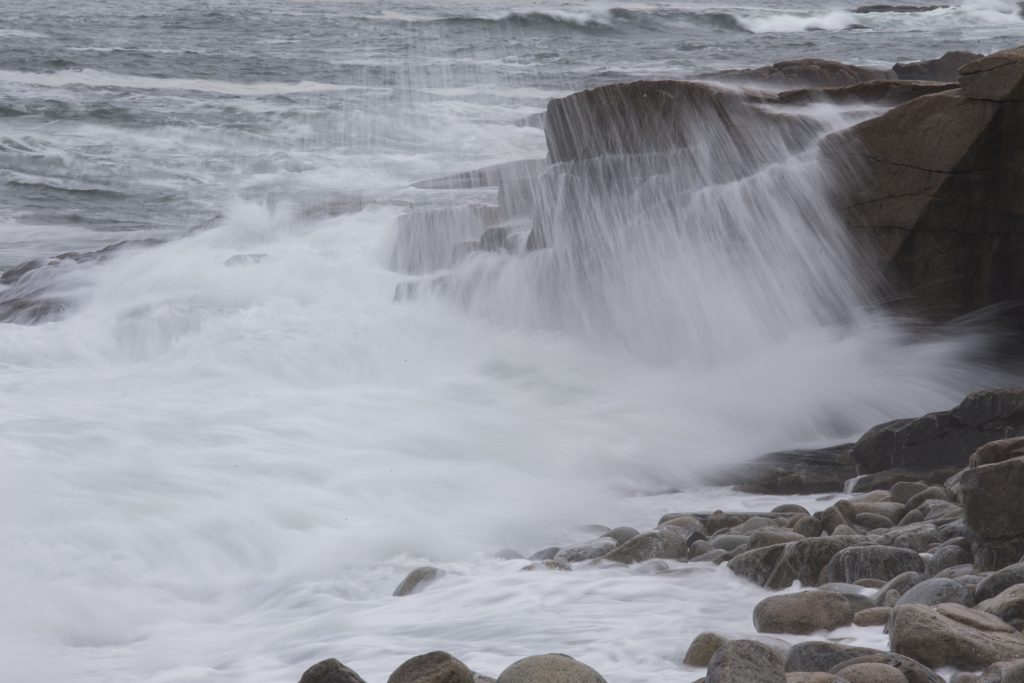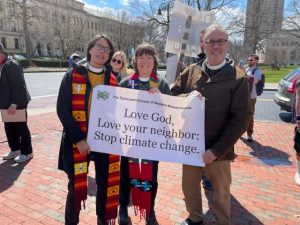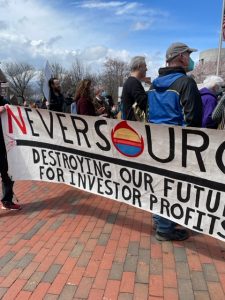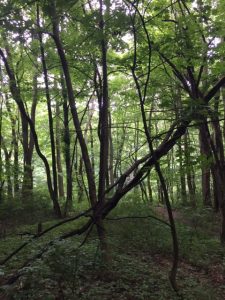Sermon for the Second Sunday of Easter (Earth Sunday)
April 24, 2022
Written and recorded by the Rev. Dr. Margaret Bullitt-Jonas for Episcopal Diocese of Western Massachusetts, Episcopal Diocese of Massachusetts, and Southern New England Conference, United Church of Christ
Acts 5:27-32
Psalm 150
Rev. 1:4-8
John 20:19-31
Earth Sunday and resurrection hope
Today is Earth Sunday, the Sunday after Earth Day, when people across the country expressed their determination to fight for a healthy and habitable planet. Over the years I’ve celebrated quite a few Earth Sundays, as maybe you have, too, and I’ve noticed that Earth Sunday often lands, as it does today, on the Second Sunday of Easter.
What happens when we bring Earth Day into the light of Easter? The first thing to say is that our Easter liturgies are clear that the life, death, and resurrection of Jesus Christ is good news not only for human beings but also for the whole of Creation – for rivers and mountains, forests and fields, hawks, whales, and bees. At the Great Vigil of Easter, when we mark Jesus’ passing from death to life, we start by lighting a fire in the darkness and by listening to someone chant these ancient words:
Rejoice and sing now, all the round earth,
bright with a glorious splendor,
for darkness has been vanquished by our eternal King.
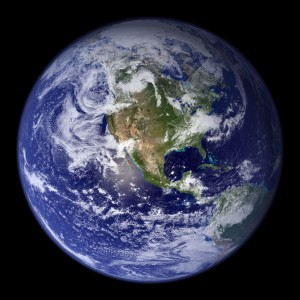
Rejoice and sing now, all the round earth! Christ is risen!
Too often our liturgies limit the good news of Christ to human beings, and we push to the margins all the other creatures and natural elements with whom we share this planet, as if
Homo sapiens were the only species of any interest to God. But Easter and Earth Day give us a chance to remember the larger truth: according to Scripture, God loved the whole world into being, sustains all things through the Holy Spirit, and through Christ redeemed and reconciled all things in heaven and on earth “by making peace through the blood of the cross” (
Colossians 1:19). What’s more, our Christian faith looks ahead to the renewal of
all things (Matthew 19:28), to the restoration of
all things (
Acts 3:21), to the day when humans live in peace with God, with each other, and with the whole of God’s creation. Folks, the good news of God in Christ is not just for us – it’s for all the round Earth!
That’s one reason I like associating Earth Day with Easter: we have a chance to highlight the deep ecological meaning of faith in Christ. Cherishing and protecting the natural world is not just an “add-on,” a sideline hobby for a few Christians who call themselves “environmentalists.” In fact, protecting the Earth that God entrusted to our care is central to being Christian. It’s a faithful response to the very first task given to humans at the very beginning of Genesis – to “till and keep” the Earth (
Gen. 2:15), to be stewards and caregivers. Prophets and sages throughout the Bible, culminating in Jesus himself, cajole us and urge us to participate with God in creating a beloved community in which people and the land live together in balance and harmony, in a
shalom of justice, wholeness, and peace. Mystics of every faith tradition tell us that human beings are not separate from – much less “above” – the rest of the created order but are siblings of wind and water, of porcupine and tree – all of us, every living being, every element of the natural world, created and cherished by the same almighty God.
What strikes me this year, as we consider the familiar story from John’s Gospel that we always hear on the Second Sunday of Easter, is that it’s a tale of how ordinary people begin to grasp the meaning and power of resurrection. It’s a story not just about Jesus’ resurrection, but
ours, as well. The story begins in a closed, tight place. The disciples are huddled inside a house with the doors locked, the text says, “for fear of the Jews.” The term “Jews” could more accurately be translated as “Judeans,” referring to a local group of religious leaders caught up in a power struggle in Jerusalem. The point is that the disciples are frightened, and we can understand why – they’ve been through trauma; their beloved friend and leader has been brutally executed; they could well be hauled before the authorities as accomplices of Jesus; and they are wrestling with guilt and shame for abandoning or denying him. That very morning, Christ rose from the dead, and although it seems they’ve heard about it – the verses right before this story report that Mary Magdalene told the disciples that she’d seen the risen Lord – apparently the news hasn’t really reached them; it hasn’t transformed them; it hasn’t changed a thing. They are still frightened, huddled, and alone. The resurrection, if it’s real, might be good news for someone else but it hasn’t had much impact on
them.
I want to stop right here, for I think that’s where many of us find ourselves this year: closed down, holding back, locked up tight. The brutal war unfolding in Ukraine, the appalling revelations of corruption and self-serving in the halls of power, the crushing weight of racism and economic inequity – all these and more can overwhelm us with the stubborn power of sin and death. News of the natural world may drive us even further into despair: relentless rises in global temperatures, driven largely by the extraction and combustion of fossil fuels; last month’s collapse of a massive ice shelf as an extreme heat wave blasted Antarctica with some areas reaching temperatures 70º Fahrenheit above normal; dead coral at Great Barrier Reef; wildfires and drought out West; hurricanes down South; and a sweeping new report from the U.N.’s Intergovernmental Panel on Climate Change announcing that it’s now or never if we’re going to limit global heating to 1.5º Celsius, the uppermost limit to keep Earth reasonably protected from catastrophic climate change. What’s a person to do but duck their head, close the door, and turn on the TV, right? It’s easy to slide into “doomerism” – into the hopeless conviction that it’s too late to turn this around, it’s not my responsibility, the future is set in stone and can’t be changed – in short, death will have the last word. Of course, succumbing to this temptation pleases fossil fuel companies, since our passivity allows them to go on merrily extracting, selling, and reaping billions from their products.
But into the closed room of withdrawal and fear steps the risen Christ. Christ isn’t stopped by locked doors or locked hearts. He comes and stands among us, breathing forgiveness and peace. “Peace be with you,” he says to the disciples – indeed, he says it three times in this one short passage. “Peace be with you.” Christ’s peace is timeless, and he is offering it to each one of us right now. Can you breathe it in? Right now, as we share this time together, can we let Jesus draw near and, with our next breath, can we breathe in his presence, breathe in his love and forgiveness? As we breathe out, can we extend that compassion to the world around? Experiencing the resurrection is as intimate as breathing in and breathing out, as intimate as the subtle shift of a heart that has been closed now beginning to soften, as tender and powerful as a new sprig of grass pushing up through asphalt.
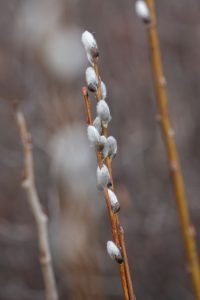
Then, as Jesus breathes peace into his frightened, guilty, and now awe-struck disciples, he shows them his wounded hands and side. When Thomas refuses to believe unless he sees and touches the mark of the nails in Jesus’ hands and puts his hand in Jesus’ side, Jesus invites Thomas to reach out and touch the wounds.
I wonder what the disciples see when they look at Jesus’ wounds. Surely in those wounds they see the harsh reality of violent suffering, sin, and death, but I wonder if those wounds are now radiant – if they are now lit up with love, and if light is pouring from Jesus’ wounded hands and side. In gazing at his wounds, I wonder if the disciples see that all the wounds of their lives, all the wounds of the world, have been taken up into God.
I wonder what it would be like if we could look at the wounds of creation like that.
I wonder if we could learn to see the wounded Earth as revealing not only the harsh reality of sin, suffering, and death, but also as lit up with God’s undying love. I wonder what it would be like if, in tending to the wounded body of creation, we knew that we were also ministering to the wounds of Christ – so that in every act of love for creation, in every choice we made, say, to eat less meat and move to a plant-based diet, to walk rather drive, or to push for state and federal policies that promote renewable energy and keep fossil fuels in the ground, we were honoring the presence of the wounded and yet risen Christ.
For it is not only peace that Jesus gives his disciples. He gives them a commission. “As the Father has sent me, so I send you” (John 20:21), he says, breathing into them the Holy Spirit, the same creative wind and energy that moved across the face of deep at the very beginning of creation. Jesus not only loves and forgives us – he also summons us to share in the divine life of God that pours itself out in acts of justice and compassion. Like Jesus, we, too, have been sent here on a mission. We participate in the same holy work that he began.
The early Christians were really clear about that. They shared Jesus’ passion to welcome and bring into being the love and justice of God. Like him, they stood up to the empires and unjust powers of this world. The New Testament suggests that they spent as much time inside jail as outside! As we heard in today’s reading from the Book of Acts, when Peter and the apostles are asked why they refuse to cooperate with the police and local authorities, they answer, “We must obey God rather than any human authority” (
Acts 5:29).
Today, Christians and people of many faiths are rising up to call for an end to new fossil fuel projects and a rapid, just transition to a sustainable future. Some of you listening to these words in Massachusetts have joined rallies to protest a new gas pipeline in Springfield, to stand against a compressor station in Weymouth, or to stop a proposed new power plant on the North Shore. Some of you have organized a team to block coal trains. Some of you are planting community gardens, pollinator gardens, and Good News Gardens. Some of you are supporting local land trusts to protect forests and farmland. Some of you are fighting to make clean energy accessible to low-income communities. Some of you have joined
campaigns to push the four biggest banks who finance fossil fuels (Chase, CitiBank, Wells Fargo, and Bank of America) to quit propping up the oil and gas industry. Some of you will join the
Poor People’s Campaign on June 18
th in a March on Washington.
We are so done with huddling in fear! Whenever the crucified and risen Christ draws near and opens the closed doors of our minds and hearts, as he does today and every day, we hope to breathe in his love, to receive his forgiveness, to honor his wounds, and to find our place in the Spirit-filled, justice-seeking movement to protect the web of life that God entrusted to our care.
Rejoice and sing now, all the round earth! Christ is risen! The Lord is risen, indeed! Alleluia!
_______________________________________________________________________________________________________________________________
On April 24, 2022, Rev. Margaret delivered this sermon in person at Immanuel Congregational Church in Hartford, Connecticut, as part of GreenFaith’s Sacred Season for Climate Justice. A video of the sermon as recorded for the two Episcopal dioceses in MA and for Southern New England Conference, UCC, is posted on her YouTube channel and on the respective Vimeo or YouTube channels of those faith communities.
